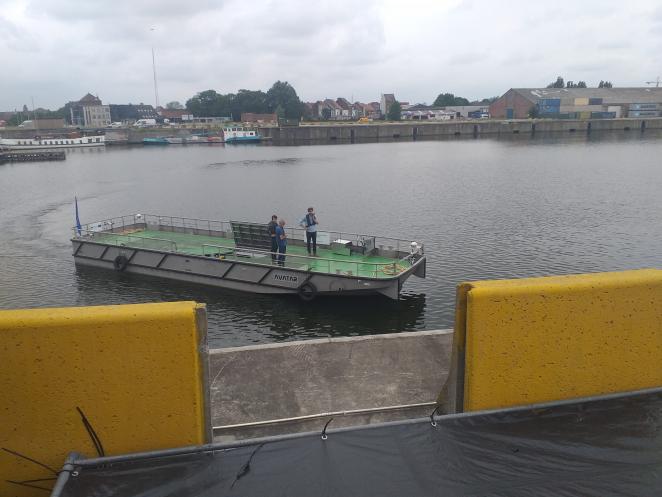Key Challenges
The pilots concentrate on demonstrating and evaluating sustainable city freight distribution in and around Ghent, Belgium, by shifting road transport flows to inland waterways. These three pilot flows—covering construction materials, waste logistics, and agrologistics—aim to prove that inland waterway transport (IWT) can serve as an efficient, low-emission solution for urban freight challenges.
By combining these flows into one Belgian Freight Flow Coalition, the pilots can share resources, learn from common experiences, increase capacity use of the vessel by using additional transport volumes and present a unified approach to policymakers and industry stakeholders. Ultimately, the pilots seek to bridge the existing cost gap between traditional road freight and waterborne transport, thereby making greener city logistics economically viable.

FFC5–7’s Objectives
Why?
To reduce traffic congestion, air pollution, and carbon emissions by promoting alternative, low-emission freight solutions in Ghent’s urban logistics.
How?
By testing three complementary freight flows (construction, waste, and agrologistics) under real operational conditions and by quantifying and comparing costs and emissions to illustrate the benefits of waterborne transport.
Where?
Along the canals and rivers of Ghent and its surroundings and connecting logistics hubs to urban wharves and key city-center destinations.
The Three Freight Flows at a Glance
- FFC5: Construction Materials
- Focus: Supply of building and renovation materials to city-center projects.
- Challenge: Infrastructure constraints and ensuring efficient last-mile delivery.
- Benefit: Reduces heavy truck traffic in congested urban areas.
- FFC6: Waste Logistics
- Focus: Collecting and transporting household and industrial waste from Ghent to processing sites.
- Example: The “Floating Recycle Park” concept, where a vessel temporarily serves as a mobile drop-off point.
- Goal: Streamline waste management while lowering emissions.
- FFC7: Agrologistics
- Focus: Distribution of local food and floriculture products to urban retail shops.
- Aim: Strengthen short supply chains, maintain product freshness, and reduce the carbon footprint.
- Challenge: Balancing just-in-time deliveries with reliable waterborne scheduling.
This video was produced on behalf of Provincie Oost-Vlaanderen and POM Oost-Vlaanderen to support and promote the InnoWaTr project.

(Potential) Project Partners
De Vlaamse Waterweg: Providing access and permissions, managing wharves, and coordinating infrastructure.
Local Operators & Stakeholders:
- Construction Sector (e.g., building material suppliers)
- Waste Management (e.g., waste collection companies)
- Agrologistics & Farmers’ Cooperatives
Ensuring real-world testing of loading, unloading, and scheduling.
Knowledge Centers: Offering feasibility studies, environmental assessments, and business modeling.
City of Ghent (Associated Partner): Supporting policy frameworks, connecting pilot results to city strategies on sustainability and urban development.